Where to Start With Molly Ringwald
It's not The Breakfast Club
Molly Kathleen Ringwald burst onto the scene in the early 1980s as America’s perky teen sweetheart, but her story, and her career, are far richer (and sometimes darker) than that high-school detention flick suggests. Born in 1968 in Roseville, California, Ringwald grew up in a showbiz household. Her mother Adele Frembd was a cook and her father Bob Ringwald a blind jazz pianist. By age five she was already acting (appearing in Alice in Wonderland on stage) and at six she cut a full Dixieland jazz album (“Molly Sings: I Wanna Be Loved by You” with her father’s band). A Disneyland patriotic album followed when she was 11, and she even had early TV roles: young Molly Parker on Diff’rent Strokes and The Facts of Life (1979–80) before being suddenly cut during the show’s cast shake-up. In short, by the time she was 13 Ringwald was a seasoned performer: child actress, singer, dancer and student of life in Los Angeles.
Brat-Pack Breakouts and Iconic Hughes Flicks
Her big break came thanks to Chicago writer-director John Hughes. Hughes famously spotted Ringwald’s headshot and wrote Sixteen Candles (1984) around what he imagined her character to be. The film made her a breakout star. Her Golden Globe–nominated debut as Samantha Baker (the girl whose 16th birthday is forgotten by her family) immediately endeared her to millions. Overnight, Ringwald became emblematic of 1980s teen angst. She reprised the role of the vulnerable Everygirl in Hughes’s next two films, Claire Standish in The Breakfast Club (1985) and Andie Walsh in Pretty in Pink (1986), cementing her image as the sensitive, fashion-forward “it girl” of the era. By 1986 she was everywhere. The media put her on the cover of Time magazine (May 26, 1986) to represent teen culture, and she was lumped in with the so-called Brat Pack of young stars, even though she later joked she wasn’t really one of that crew. But I’ll touch on that later.
Sixteen Candles, The Breakfast Club and Pretty in Pink were massive hits and became part of Gen X culture and film mythology. Claire’s couture prom dress, Samantha’s awkward candlelit party, and Andie’s bubble-gum pop of pink, these images defined a generation. For reference: Sixteen Candles earned Ringwald a Young Artist Award for Best Young Actress, and The Breakfast Club still sits in the Criterion Collection decades later.) Hughes’s films were sui generis. No one was writing such teen stories from a young woman’s POV at the time, so Ringwald became Hollywood’s default “girl next door.” Yet even then she knew it wasn’t all rosy: she later quipped that in reality she was “figuring out who I was, too” and that being “projected as this perfect, sweet American girl next door” was actually quite a burden.
Beyond the Big Three: Later Films and TV Ventures
Of course, Ringwald did plenty outside of that trilogy. After Pretty in Pink, she started seeking “darker” or more grown‑up roles, but Hollywood mostly held on to her teen image. She did branch out in the late 1980s leading a drama about teenage pregnancy (For Keeps, 1988), co-starring with Robert Downey Jr. in the romantic comedy The Pick-up Artist (1987), and even dabbling in some cult horror territory (House of the Devil, 2009) and weird indies (King Cobra, 2016). On television she played roles as varied as a suicidal teen (Surviving: A Family in Crisis, 1985) and a journalist (Something to Live For: The Alison Gertz Story, 1992). The latter an AIDS-themed TV movie for which she won critical praise. In 1994 she led Stephen King’s miniseries The Stand and tried sitcom life on Townies (1996). After Sixteen Candles, she even turned down Hughes’s Some Kind of Wonderful (1987) because she felt it was just “too similar” to her other roles. This was a decision she later laughed at, confessing on NPR, “I got typecast anyway… so I should have just kept working with him”. Yes, she should have, but the film was great anyway.
Ringwald didn’t just stay in Hollywood, either. In the mid-1990s she moved to Paris to recharge, leveraging her fluency in French to star in arthouse films (Jean-Luc Godard’s King Lear among them). She also turned to theater (Broadway’s Cabaret as Sally Bowles, Tick… Tick… Boom! in New York) and even jazz singing. In 2013 she released a full vocal album (Except Sometimes, on Concord) showcasing standards like “My Baby Just Cares for Me.” Later in life Ringwald became a novelist (the 2012 short-story collection When It Happens to You) and translator (she worked on My Cousin Maria Schneider, the memoir of Last Tango’s Maria Schneider). These pursuits show she’s far more than an “80s girl” stuck in time.
Meanwhile her filmography kept growing in curious ways. Anyone who watched Netflix’s 2020 teen comedies The Kissing Booth 2 and 3 got a kick out of Ringwald as Mrs. Flynn, the trendy guidance counselor. On TV she’s popped up everywhere from Psych to Nickelodeon’s Doc McStuffins. More recently she’s enjoyed a bit of an indie renaissance: she recurred as Mary Andrews (Archie’s mom) on Riverdale, joined Ryan Murphy’s Monster: The Jeffrey Dahmer Story as Dahmer’s mother (2022), and even played novelist Joanne Carson in FX’s Feud: Capote vs. the Swans (2024). In short, once you realize she’s beyond Breakfast Club, you see a performer who never really stopped reinventing herself.
In short, the Molly Ringwald filmography is as eclectic as her fan mail. She’s done sitcoms and sagas, Broadway and Buffy (voice roles), translations and teen dramas. As one 2012 profile put it, she “has handled a lifetime of fame” by continually diversifying. And in that spirit, the question Where to start with Molly Ringwald? really answers itself: if you only know Breakfast Club, widen the lens. You could start with her vocal debut, or jump into a John Hughes film you missed. Heck, try Feud (2024) and see her play well beyond that “girl next door” label.
Check out my Molly Ringwald Starter Checklist below—
Revisiting the 80s: Ringwald’s Modern Take
In recent years, Ringwald has spoken very openly about her feelings toward those teen classics, and, as you might expect, the interview soundbites have been colorful. She’s admitted that watching The Breakfast Club with her own children (especially a precociously critical tween daughter) is “such an emotional experience” that she “hasn’t found the strength” to do it again. Sigh. On SiriusXM radio she laughed, “My 12-year-old daughter Adele is the most woke individual that you’ve ever met… I just don’t know how I’m gonna go through that… watching it with her and [her] saying, ‘How could you do that? How could you be part of something…’”. You mean, part of something that has tapped into the zeitgeist of a generation? Films that have resonated deeply with an entire age group? In other interviews she’s pointed out Sixteen Candles and Pretty in Pink contain elements (homophobic taunts, school stereotypes) that today make her squirm. For instance, she blurted out at a panel that The Breakfast Club is “very, you know, it’s very white… You don’t see a lot of different ethnicities… We don’t talk about gender… None of that”, implying it wouldn’t work as a modern story without changes. Why can’t we simply accept that it was a different time, with different sensibilities, and that modern stories have certainly tried to make up for whatever perceived wrongs that films from those days may have neglected… BUT… how successful has that been for modern Hollywood?
Yet despite the “troubling” parts she’s identified, Ringwald stresses she still loves the movies in many ways. As she told People, on the one hand the films have rough edges, “but they’re also about people that felt like outsiders… they speak to a lot of people. They’re complicated, and that’s what makes the movies really wonderful.” And, she adds earnestly, acknowledging flaws doesn’t mean erasing them: “I’m proud of those movies and I have a lot of affection for them. They are so much a part of me”. That’s what Gen X needs more of, Molly.
Contextualizing the Critique
Still, some fans felt a pinch when Ringwald aired these modern grievances. Critics of her comments have suggested they come off as ungrateful or too influenced by “woke” 2020s thinking: why bite the hand that gave her endless Friday-night love? It’s the age-old Gen‑X grumble: “We love that movie! Back off, cool kid.” (Imagine if John Hughes himself were alive, would he re-write Sixteen Candles for 2025? Unlikely, but the point stands.)
On the other hand, it’s fair to parse what Ringwald actually said. She isn’t demanding the films be deleted, she’s reflecting on how tastes and standards have changed. It’s true these John Hughes movies bear the fingerprints of their time. A teen comedy from the mid-80s starring suburban Midwestern high-schoolers naturally had almost entirely white students (reflecting Detroit-area Chicago then), no mention of sexual orientation, and social norms we’d call dated now. Sixteen Candles itself was criticized even then for its racial and sexual jokes. But Hughes’s intention was to give voice to feeling-rootless teenagers in a way no one else did. And he did so with a playful pop sensibility that felt progressive in 1984. Remember, Hughes put a teen girl in charge of the story at a time when the average studio comedy had three boys for every one girl. By 1986, having female-led teen films at all was a novelty. As Ringwald noted in the New Yorker, Hughes gave center stage to young women’s concerns (“pride and honor and respecting who you are” at the prom) when most Hollywood comedies were boy-centric.
In other words, when we judge these films, we must remember their original world. Yes, Jake Ryan bonding with a black baby in Pretty in Pink was a nice moment that felt forward-thinking. But also, the school halls of Breakfast Club being all-white was just the reality of Hughes’s suburban Chicago at that time (not necessarily a sinister oversight). Ringwald herself recently pointed out that The Breakfast Club could hardly be remade today without recasting it as something very different, given how much America has changed. She’s essentially warning against applying a 2024 lens to a 1985 script.
It’s a reasonable stance, even if expressed bluntly. (Full disclosure: The Breakfast Club is one of my personal favorites. I think it’s very misunderstood even though it is very widely regarded.) Hearing it called “very white” can initially sting a bit. But again, it must be considered in perspective. Few of us want our cherished memories scoffed at, but Ringwald often couches her criticism in affection. She’s quick to say those films were vital to outsiders like her, and she even identified what she’d change if she were writing them today – all while acknowledging she wouldn’t erase a word of them. I do my best to give her a pass when she’s in one of those “interview moods.”
As a Gen Xer myself, I know we have a legacy of foot-in-mouth re-evaluations. Remember when Dirty Dancing was suddenly “problematic” or when TV parents in 90s sitcoms were declawed? Ringwald’s comments are just another iteration. What ultimately matters is what fans take away from the films. Many will shrug and remember Molly as Claire the spoiled princess or Sam the birthday girl, not as a future critic. Others will appreciate that the actress who embodied their teen angst is also thinking critically as a parent and artist. Although, as a Gen Xer, I also think she needs to be more laid back and not so critical of projects a great majority hold in great regard. Sure, she was in the films, but they’ve taken a life of their own in the hearts of many. I suppose we all want her to respect that and not take herself so seriously.
Molly Ringwald on Her Own Terms
Decades after she first made us all want to stay late at school detention, Molly Ringwald is still shuffling the deck, only now it’s her deck. As Fresh Air observed in 2024, early success may have typecast her, but “I’m really happy with where I’m at right now”, she declared. She’s an author, a jazz singer, a French film star, a TV mom and horror scream queen all in one career. Whether it’s Sixteen Candles, Riverdale, or her own French poetry translation, Ringwald has crafted a path that’s loyal to her adventurous spirit.
So, where to start with Molly Ringwald? It might not be The Breakfast Club – but it’s right up there. It’s definitely not her Cafe Society cameo in JEM and the Holograms. It could be any film or role that lets you see past the hairspray and scrunchies. But if we’re really narrowing it down to her iconic filmography, I’d suggest you consider the following:
Sixteen Candles (1984)
Start here. This is her breakout and the John Hughes prototype for teen angst, awkwardness, and unforgettable birthdays.The Breakfast Club (1985)
The crown jewel. Defines 80s teen cinema… Ringwald as the princess with unexpected depth. Everyone finds themselves in this movie.Pretty in Pink (1986)
Peak icon status. Style, heartbreak, and a love triangle that still sparks debates. Duckie vs. Blane. Enough said.For Keeps (1988)
Underrated detour. Teen pregnancy drama. Ringwald stretches past high school, showing real range.The Pick-up Artist (1987)
Optional watch. Quirky chemistry with Robert Downey Jr., but it’s more RDJ’s show than hers.Betsy's Wedding (1990)
Exit point. Her swan song of the era before moving away from the teen spotlight. A bridge to her adult career. Also, the cast is amazing!
Why this path? It’s chronological, yes, but more importantly, it shows Molly’s growth from teen queen to young adult actress, without drowning in lesser post-peak roles.
There’s little doubt that Molly has always been a fiercely independent artist who outgrew her Disney-phase good girl image and never really looked back. In 1984 she made an entire generation laugh and cry over prom night drama. In 2024 she’s reminding us to laugh (and think) about that prom night drama. So maybe, just maybe, we need to cut her a little slack.
Nostalgia Nation is a weekly (sometimes bi-weekly) newsletter written by John Toma (aka. That 80s Dude), the author of Nostalgia Nation: The Definitive Chronicle of Growing Up Gen X. If you enjoyed this essay and want more thoughtful nostalgia pieces, along with fascinating historical tidbits delivered with wit and personality, think about supporting Nostalgia Nation!
This publication can only exist with your support — use this link for 20% off Forever Patron subscription and unlock the full archive, including the Nostalgia Nation Weekly Roundup!




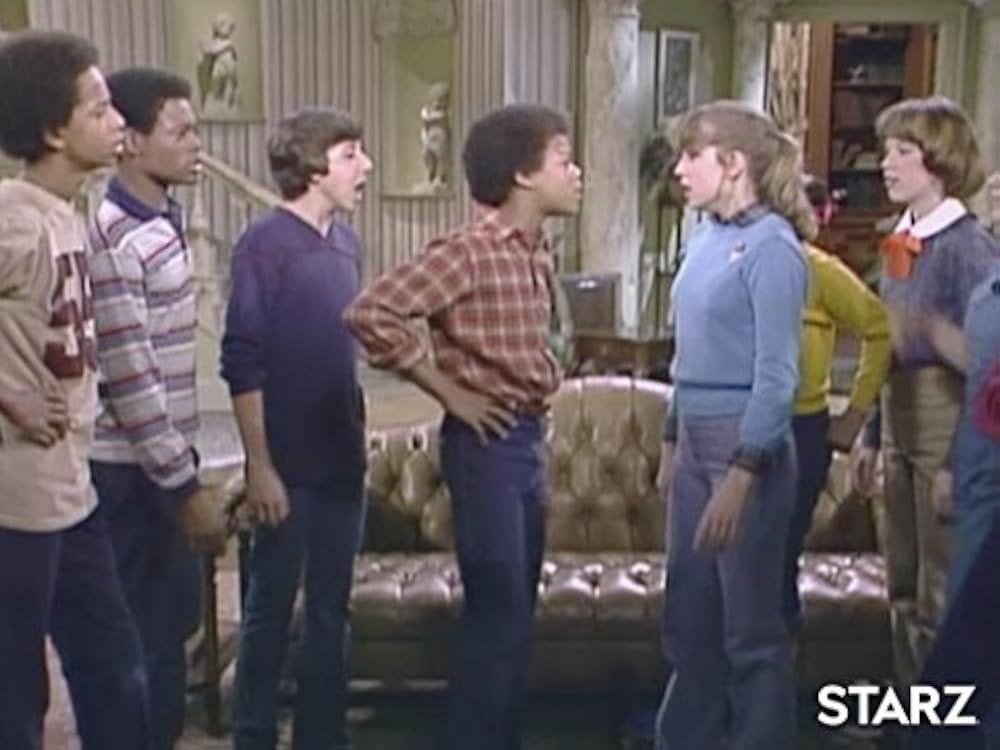
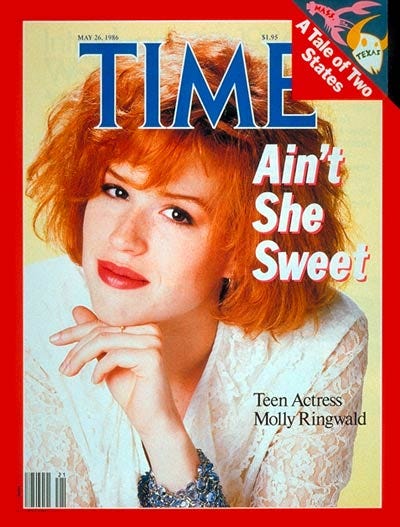
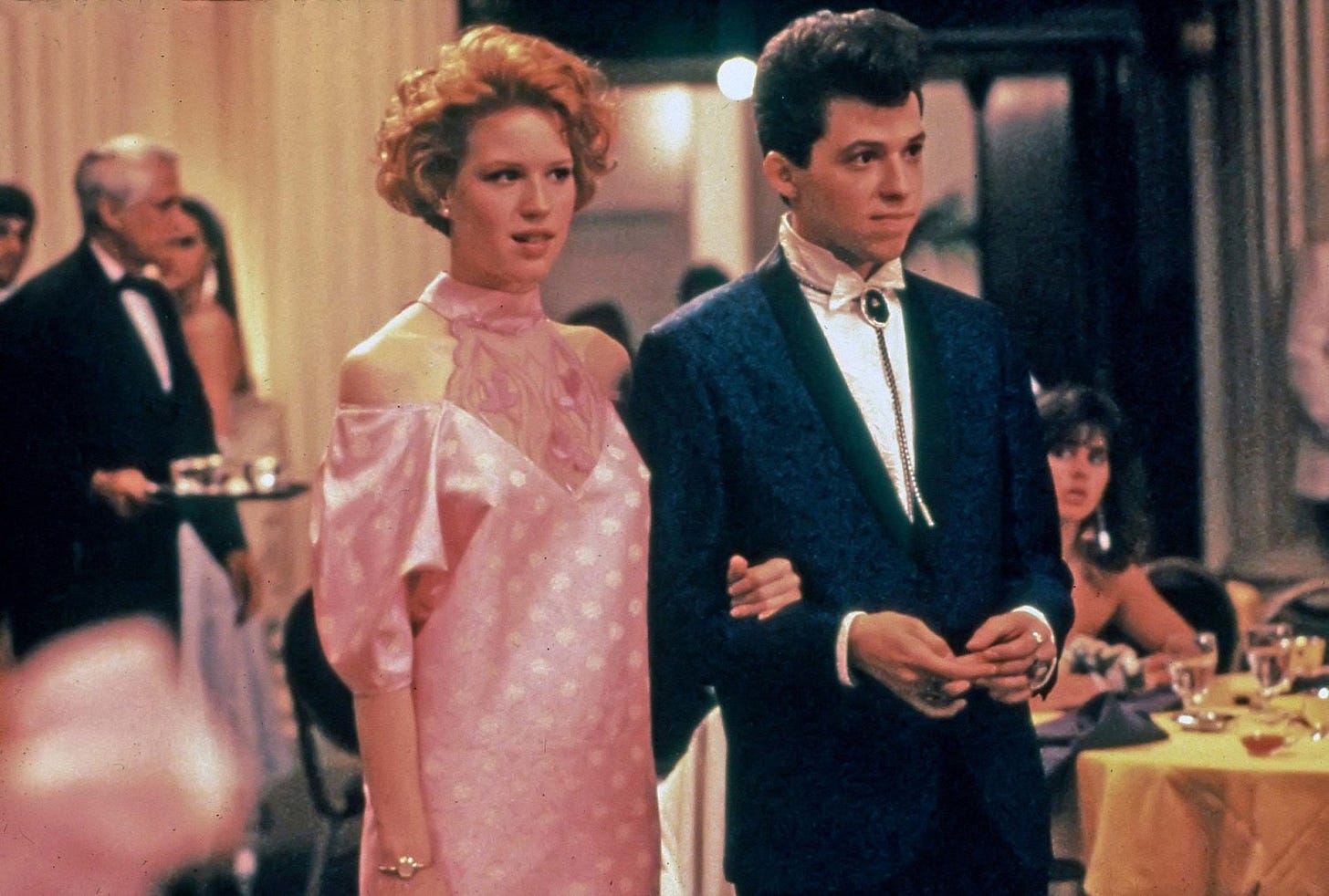
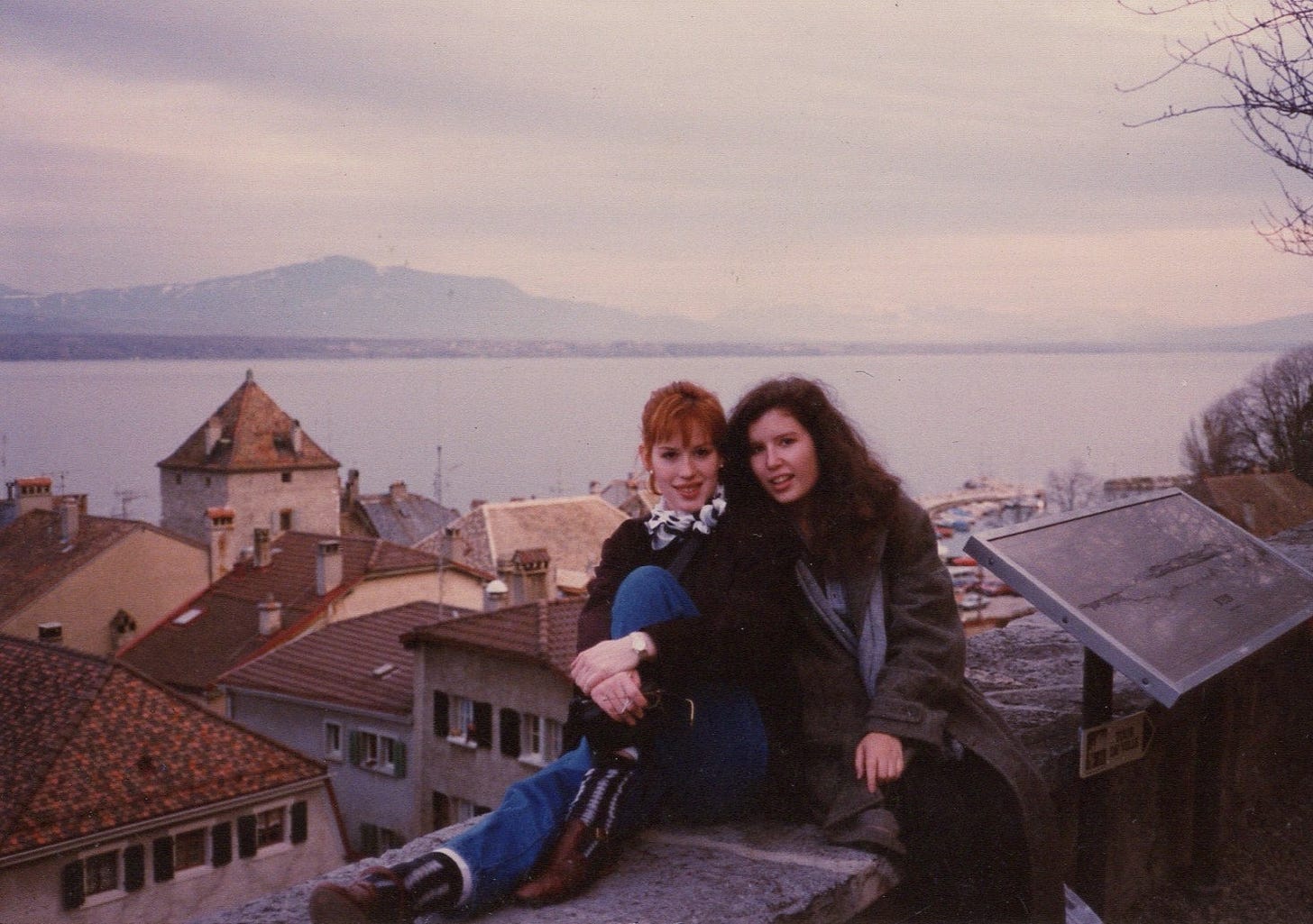
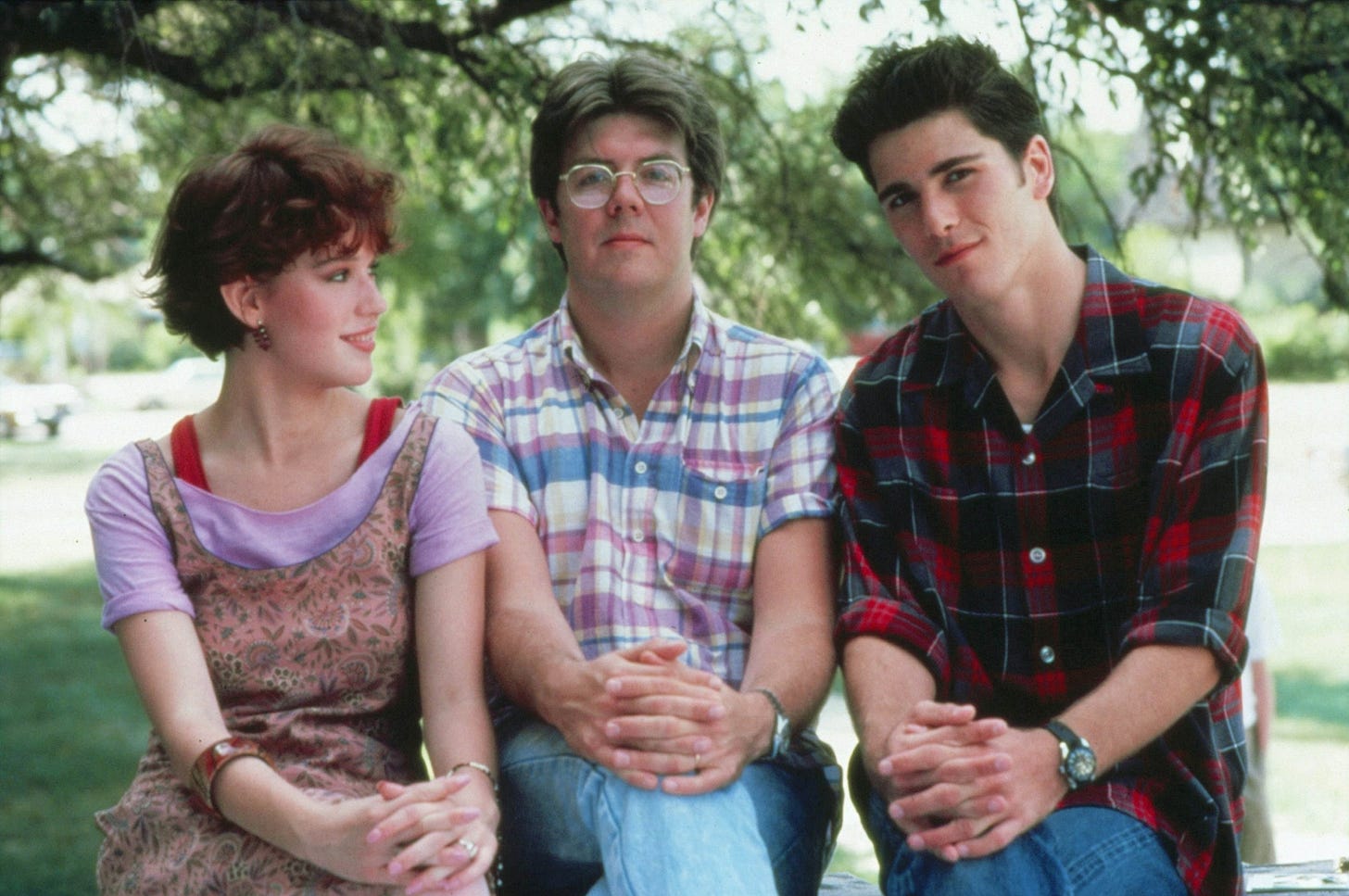
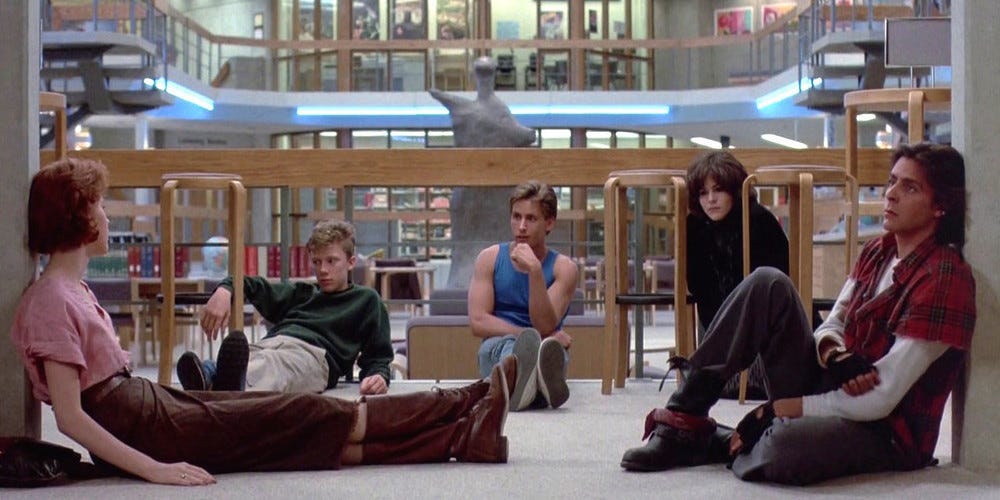
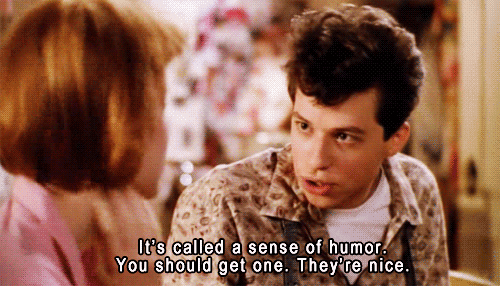

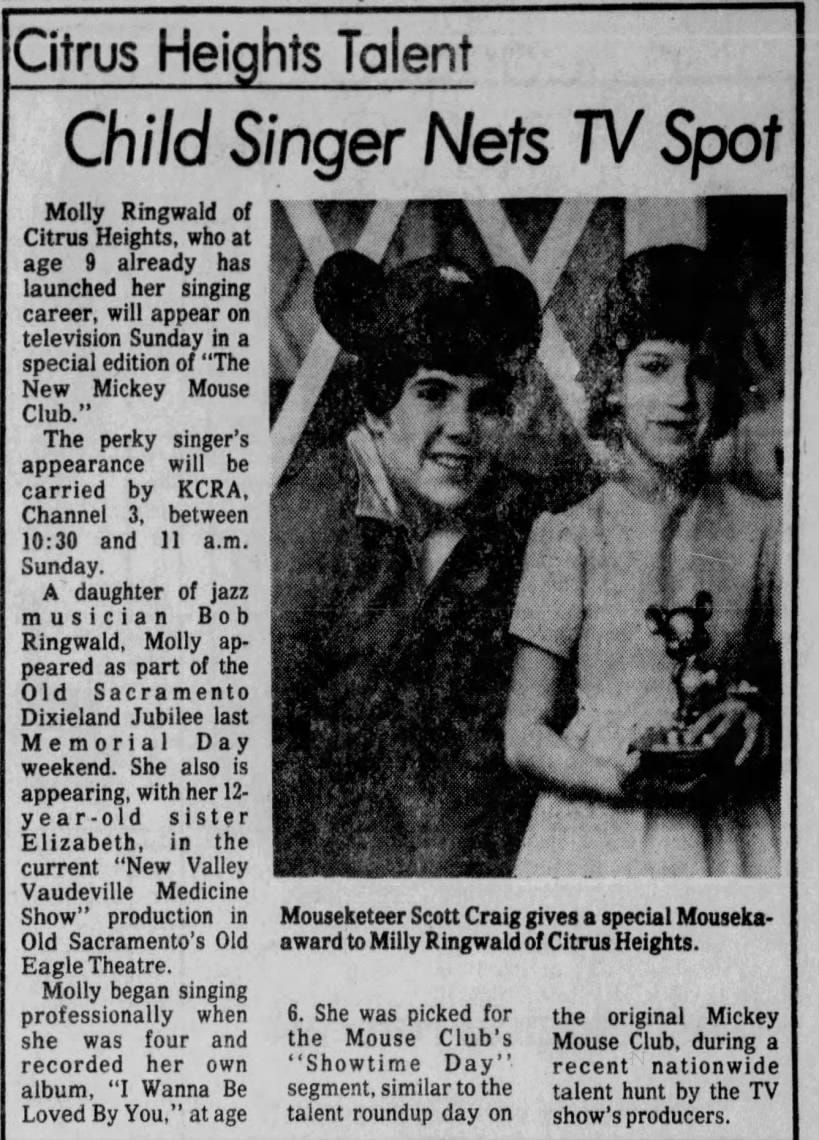

She makes fair points about its time era limitations. Still, BC is the consummate Gen X film, no question.
Excellent work!